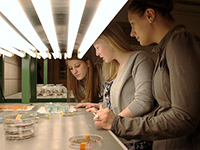This spring marks a milestone. For the first time, every student who takes an introductory biology course through CBS will have a research experience.
|
The effort to introduce all students taking intro biology at the College of Biological Sciences to the scientific method was launched nearly four years ago with the help of a $1.5 million Howard Hughes Medical Institute (HHMI) grant. As of this spring, that goal was achieved with a mix of strategies and research opportunities (wet lab and in silico). Non-science majors were offered opportunities to use data from the Snapshot Serengeti project. Transfer students, who often miss out on Foundations of Biology, were given the opportunity to work in a research lab with a post-doc or grad student through “research apprenticeship” and the Nature of Research course. Since 2010 when the project launched, about 800 transfer students and 12,000 non-science majors have had the opportunity to gain a deeper understanding of the nature, process and limitations of science through research experience. “This grant made it possible to achieve our goal of providing authentic research experiences to every student who enters our classrooms, whether they began with us as freshmen, transferred to CBS from a community college, or are simply fulfilling a general education requirement," says Robin Wright, associate dean for academic and faculty affairs and director of the HHMI program. The current HHMI grant wraps up this August. The next phase of the project will focus on providing opportunities for students to do research based on their own original questions. |

|